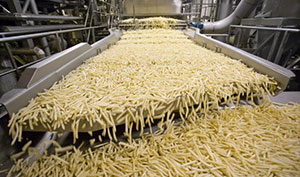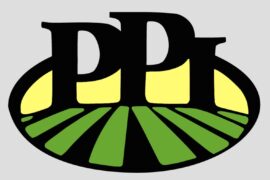The first large-scale frozen french fry factory in Russia is now up and running. Local production in the Lipetsk special economic zone is expected to cover almost 100% of current import demand for the increasingly popular product.
The official opening of the Russian Belaya Dacha Group and Lamb Weston/Meijer (LW/M) joint venture plant was ceremoniously marked by Ivan Lebedev, state secretary and deputy minister of agriculture of the Russian Federation, and Oleg Korolev, head of the executive branch of the Lipetsk region.
 During the grand opening, Lebedev highlighted the importance of this production facility as another step toward meeting food demand in Russia through local production.
During the grand opening, Lebedev highlighted the importance of this production facility as another step toward meeting food demand in Russia through local production.
“Over the last few years, Russian agricultural producers have reduced twice the import of goods with the help of state subsidies,” he remarked. “An increasing number of both processing companies and consumers prefer local agricultural products. Our main goal is to provide our domestic market with high quality food at a fair price. This once again proves the necessity of projects such as this new potato processing plant.”
The construction project was subsidized by the Russian State Program for Agriculture Development. The total investment amounted to 8.7 billion rubles (approximately €115 million), and 218 new jobs were created in the process. By the end of 2019, the plant is expected to reach full processing capacity of approximately 200,000 tons of potatoes per year.
“Investments are crucial for the development of our region, since it involves advanced technologies and creates new jobs and thus great possibilities for young professionals. By establishing strong business contacts, we ensure positive future perspectives for the region and the well being of our citizens,” said Korolev.
 “This potato processing plant is one of the key priority projects for the Belaya Dacha Group. I am glad we have combined our knowledge and comprehensive international experience in french fry production with a partner from abroad, said Victor Semenov, supervisory board chairman of the Belaya Dacha Group. The diversified company, which ranks as Russia’s leading producer of ready-to-eat salad and vegetable products, is celebrating its 100th year in business during 2018.
“This potato processing plant is one of the key priority projects for the Belaya Dacha Group. I am glad we have combined our knowledge and comprehensive international experience in french fry production with a partner from abroad, said Victor Semenov, supervisory board chairman of the Belaya Dacha Group. The diversified company, which ranks as Russia’s leading producer of ready-to-eat salad and vegetable products, is celebrating its 100th year in business during 2018.
 Bas Alblas, chief executive officer of Kruiningen, Netherlands-headquartered Lamb Weston/Meijer, commented: “Together with our partner Belaya Dacha, we have built this beautiful plant in Lipetsk that provides us with a unique opportunity to expand our position in the Russian market, while supporting our international key accounts in optimizing their own value chain, growing their businesses in the region and meeting local needs.”
Bas Alblas, chief executive officer of Kruiningen, Netherlands-headquartered Lamb Weston/Meijer, commented: “Together with our partner Belaya Dacha, we have built this beautiful plant in Lipetsk that provides us with a unique opportunity to expand our position in the Russian market, while supporting our international key accounts in optimizing their own value chain, growing their businesses in the region and meeting local needs.”
Rapidly Growing Market
The first customer is McDonald’s Corporation, and the expectation is that other local foodservice and retail customers will follow. In the 28 years of its presence in Russia, McDonald’s has put much effort into developing a local supply chain of top quality food products that can meet the standard of imported goods.
“Over the years of operating in Russia, we have been providing strong support and encouraging development of the vertically integrated supply system. During this period, the main product categories could be produced locally,” said Khamzat Khasbulatov, chairman of McDonald’s Russia. “With the opening of the french fries production facility, 98% of McDonald’s products will be sourced from Russian suppliers, entailing 160 flagship companies of the Russian agricultural-industrial complex. We are proud that Belaya Dacha has been together with McDonald’s from the very first years of our operation in the Russian market. Moreover, we have already had an effective cooperation with Lamb Weston for over 15 years.”
Securing Potato Supply
To cover the processing plant’s need for the special variety of high-quality potatoes, Belaya Dacha has created a farmer school that is based on its own production farm in the Tambov region. The farm supplies the new factory with 30% of the total volume of potatoes required and has its own advanced and innovative potato storage system. The rest of the spuds are purchased from local farmers through long-term supply contracts. During the last five years, the company’s agronomists have helped its growers to implement best practices regarding potato variety cultivation. As a result, yields up to 50 tons per hectare have been achieved.





